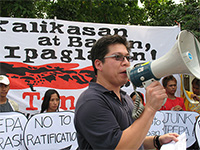International Environmental Groups Reject Japanese Waste Colonialism:
Calls for Rejection of Japan Economic Partnership Agreements
Joint Environmental Group Press Release
 |
 |
 |
 |
| |
 |
|
| |
Richard Gutierrez (BAN AP) with other environmental activists in front of the Philippine Senate, calling for the rejection of the JPEPA. |
|
 |
 |
 |
|
| |
18 January 2007 (Kerala, India; Manila, Philippines) – Over 25 environmental groups, comprising of various international and grassroots organization, participating at the Waste Not Asia (WNA) Conference in Kerala, India, collectively called for the rejection of the growing Japanese waste colonialism in Asia under the guise of Japanese Economic Partnership Agreements. The group cited the present Japan-Philippine Economic Partnership Agreement (JPEPA) as the latest effort by Japan to exploit and bully developing nations in Asia to accept its toxic wastes and technologies by stringing these with the promise of increased trade and opportunities for Filipino caregivers in the very restrictive Japanese labor market. The call by the environmental groups came as the Philippine senate is about to open hearings for the ratification of the JPEPA on January 23rd.
“Asia is not Japan’s dumping ground. It is both an affront to international law and morally repugnant for a rich country such as Japan to bully poorer nations with its money into accepting its toxic effluent,” said Jayakumar Chelaton of the Global Alliance for Incinerator Alternatives (GAIA), convenor of the WNA. “The Japanese government only places shame on its people through such underhanded practice.”
The environmental groups are calling for the following:
- For the Philippines and other Asian governments to refuse the ratification of or negotiate on the Japanese Economic Partnership Agreements until all listings of toxic technology and internationally controlled or banned wastes and substances are expunged from tariff reduction provisions and other exploitative provisions are removed.
- For Japan, the Philippines, and other Asian nations that have not done so, to ratify the Basel Convention’s Ban Amendment at the earliest possible date.
- For a full and impartial multi-stakeholder inquiry in both Japan and the Philippines must be made to determine the intent and manner of how the waste trade liberalization provisions were included in the Japan-Philippine Economic Partnership Agreements, and to hold the responsible officials accountable.
- For Asian governments should embark on a serious program to prevent hazardous and other wastes at source via toxics use reductions, stopping planned obsolescence, and holding manufacturers accountable for the products they produce, rather than seeking hiding places for wastes.
“Instead of looking for hiding places for its toxic wastes, Japan should clean up its act and eliminate toxic inputs in products, minimize its hazardous waste generation, and deal with its own wastes at home,” said Richard Gutierrez, Basel Action Network, Asia-Pacific (BAN AP). “Asia needs a vision for the future out of its waste dilemma, not the re-packaged and failed model of exploitation and environmental degradation that Japan is peddling under JPEPA.”
- End -
For more information, see: www.ban.org/library/JPEPA_report.pdf
Media contact:
Jayakumar Chelaton (Thanal-GAIA), Kerala, India: Tel. No. +91-471-2727150; e-mail: jayakumar.c@gmail.com
Richard Gutierrez (BAN AP), Manila, Philippines: Tel. No. +63-0917-506-7724; e-mail: rgutierrez@ban.org
NOTES:
The Japan-Philippine Economic Partnership Agreement is a proposed a bilateral preferential trade treaty between Japan and the Philippines that seeks to remove barriers to investments and the trade of goods and services between the two countries. JPEPA was recently signed on September 9, 2006, by the Japanese Prime Minister Junichiro Koizumi and Philippine President Gloria Macapagal-Arroyo in Helsinki, Finland.
One of the points of concern environmental groups raise against JPEPA are the inclusion of toxic wastes, which are designated for immediate reduction of tariff to 0% upon the effectivity of the JPEPA ushering the flow of these wastes into the Philippines. Some of the hazardous wastes included in JPEPA are the following:
- Ash and residue from the incineration of municipal waste;
- Waste pharmaceuticals;
- Waste Oils; waste oils containing PCBs, PCTs or PBBs;
- Lead, Cadmium, Antimony, Beryllium Waste and Scrap;
- Waste Batteries;
- Municipal waste;
- Clinical waste;
- Wastes from other chemical or allied industries;
- Wastes of hydraulic fluids, brake fluids, and anti-freeze fluids;
- Sewage sludge.
Environmental groups are also concerned over the blatant conflict of JPEPA with other multilateral environmental agreements, such as the Basel Convention and more pointedly, the Basel Ban Amendment. The Amendment calls for the complete ban on the trade of hazardous waste from rich to poorer countries.
FAIR USE NOTICE. This document contains copyrighted material whose use has not been specifically authorized by the copyright owner. The Basel Action Network is making this article available in our efforts to advance understanding of ecological sustainability and environmental justice issues. We believe that this constitutes a 'fair use' of the copyrighted material as provided for in section 107 of the US Copyright Law. If you wish to use this copyrighted material for purposes of your own that go beyond 'fair use', you must obtain permission from the copyright owner.
More News
|